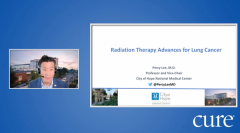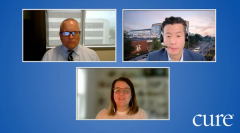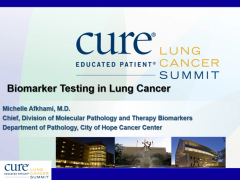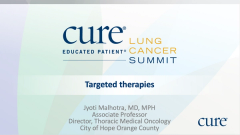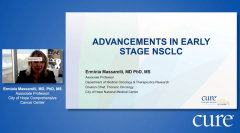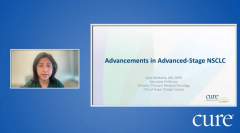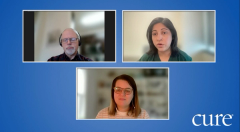
Educated Patient® Lung Cancer Summit Advancements in Advanced-Stage NSCLC Presentation: April 29, 2023
Watch Dr. Jyoti Malhotra, from City of Hope, discuss advancements in advanced non-small cell lung cancer during the CURE® Educated Patient® Lung Cancer Summit.
Episodes in this series

Twenty years ago, there were limited treatment options for patients with advanced non-small cell lung cancer (NCSLC) — nearly all patients were offered chemotherapy, and there wasn’t much beyond that, besides potentially radiation for some patients. However, within the last two decades, there has been major growth in the treatments for this disease, mainly due to the use of targeted agents and immunotherapy, explained Dr. Jyoti Malhotra.
In CURE®’s Educated Patient® Lung Cancer Summit, Malhotra, who is an associate professor and director of thoracic medical oncology at City of Hope Orange County, discussed advancements in the treatment of advanced NSCLC.
“We had limited options years ago, but that has changed,” Malhotra said.
Malhotra explained that when a patient is first diagnosed with stage 4 NSCLC, they will undergo biomarker testing, which will search for genetic alterations as well as certain biomarkers — such as PD-L1 — that may have drugs that target their specific type of cancer. Whether a person undergoes chemotherapy, targeted therapy or immunotherapy is all dependent on these test results, according to Malhotra.
Immunotherapy
The scientific name for the type of immunotherapy used to treat lung cancer is immune checkpoint inhibition. These drugs work by interrupting the “crosstalk” between tumor and immune cells that prevent the immune system from finding and fighting the cancer.
“One important component of this crosstalk between tumor cells and immune cells, which leads to the immune cells not killing the tumor cells is this PD-1 and PD-L1 molecules which are present on the surface of tumor cells and immune cells,” Malhotra said. “What inhibitors or immunotherapy or immune checkpoint inhibitors do is that they come and stop this crosstalk between tumor cells and immune cell cells and kind of lift the brakes. So then the immune cells start recognizing the tumor cells and bad cells and start killing them.”
As such, knowing if a patient’s tumor is PD-1 or PD-L1 positive (which is common in NSCLC) is very important, especially since the Food and Drug Administration approval of checkpoint inhibitors such as Opdivo (nivolumab), Keytruda (pembrolizumab) and Tecentriq (atezolizumab).
After clinical trials showed that tends to lead to better outcomes than the other available agents, it became the standard of care for patients with NSCLC, Malhotra said, noting that there are some side effects that patients need to be aware of.
“When immunotherapy is taking off the brakes from the immune system, it may take off the brakes, even in normal tissue, leading to inflammation of an organ which could be the skin, it could be the liver, it could be the lung,” she said. “When that inflammation happens, patients can present with symptoms and it needs to be treated with steroids.”
While immunotherapy has drastically improved outcomes for patients with the disease, not everybody benefits from these agents — an issue that sparked a new line of research aimed at increasing the number of patients who will do well with immunotherapy.
Most of these trials include combining immunotherapy with another treatment modality, such as chemotherapy, different checkpoint inhibitors, radiation or other novel agents.
Targeted Treatment
Antibody drug conjugates are another class of drugs that are improving outcomes in patients with advanced NSCLC.
“An antibody drug conjugate is a drug in which we combine a tumor-specific antibody to a chemotherapy through a linker,” Malhotra said. “That way, the tumor-specific antibody goes and sticks to the surface of the tumor cells, and then the chemotherapy is pushed into the tumor cells and kills the tumor cells.”
For example, T-Dxd targets the HER2 mutation in tumors. In a clinical trial, more than half of patients with HER2-mutant NSCLC responded to treatment with the agent. As a result, it was approved in 2022.
“In conclusion, targeted therapy and immune checkpoint inhibitors have really changed the landscape of non-small cell lung cancer treatment for immunotherapy. Now we are doing research on how to improve the clinical benefit from immunotherapy as well as to try to see who gets benefit and who gets side effects,” Malhotra said.
For more news on cancer updates, research and education, don’t forget to

